Alexa Statistics: Usage and Revenue Data (2025)
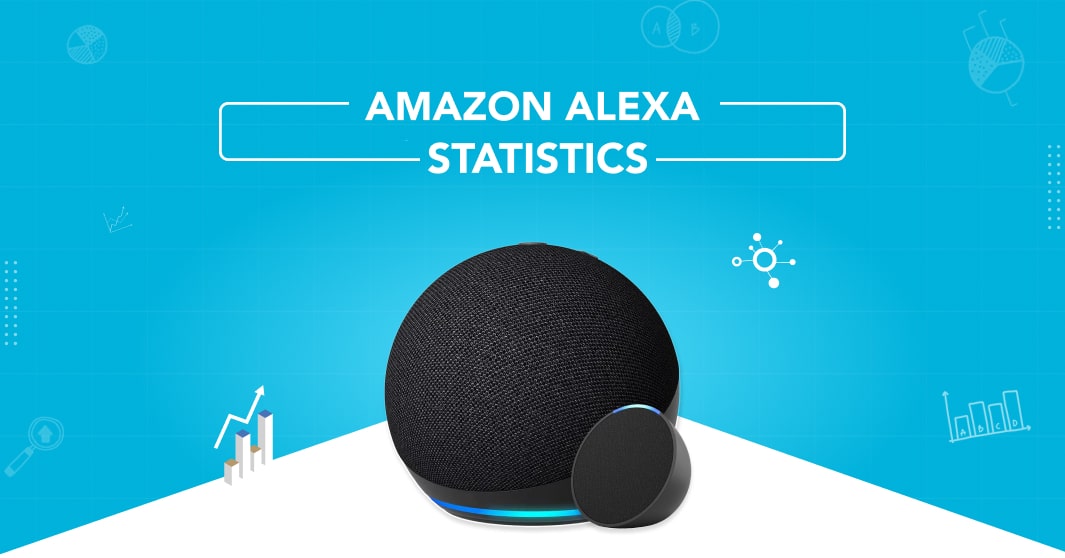
Millions of people use Amazon’s voice assistant worldwide with a reach spanning 80+ countries and fluency in over 50 languages. Alexa now sets over 100 million timers and alarms daily and controls 140,000 smart home devices!
Amazon Alexa, introduced in the Amazon Echo, is now integrated into various devices, including Echo models, smart displays, and third-party products. Alexa handles voice interactions, music playback, to-do lists, alarms, podcasts, audiobooks, weather, traffic, sports, and real-time information, and controls numerous smart devices. Amazon is rolling out Alexa+, a more intelligent, capable AI-powered voice assistant.
Discover how Alexa dominates 65% of the smart speaker market and features over 100,000 skills globally with the latest Alexa usage and revenue statistics in this post.
Alexa Statistics 2025 Editor's Picks
- There are over 600 million Alexa-powered devices in use globally.
- 63.67% of Alexa's users are men, and 36.33% are women.
- Alexa now has a 65% market share in the US.
- Amazon Alexa has a skill set of 100,000.
- Alexa has an accuracy rate of 79.8% for correctly answering questions.
How Many People Use Alexa
- Amazon Alexa Monthly active users are 600 million Alexa devices globally in 2025. Customers use these devices to play music, watch videos, and manage their smart homes.
- In 2024, approximately 68.2% of smart speaker users in the United States used Alexa-powered devices.
- The number of Alexa-enabled devices sold to date surpassed 100 million in 2023.
In 2019, the number of devices sold was modest at 60,000. However, this figure skyrocketed to 100 million in 2020, reflecting a massive surge in demand and adoption. Although the annual sales figures stabilized at 65 million for 2021 and 2022, the cumulative total continued to rise steadily.
Alexa-enabled Devices (2019 – 2023)
| Year | Number of Alexa Devices Sold |
| 2019 | 60.000 |
| 2020 | 100 million |
| 2021 | 65 million |
| 2022 | 65 million |
| 2023 | 100 million |
- Globally, the number of digital voice assistants, including Alexa, is expected to reach 8.4 billion units by the end of 2024. This highlights Alexa’s popularity and significant role in the smart home ecosystem.
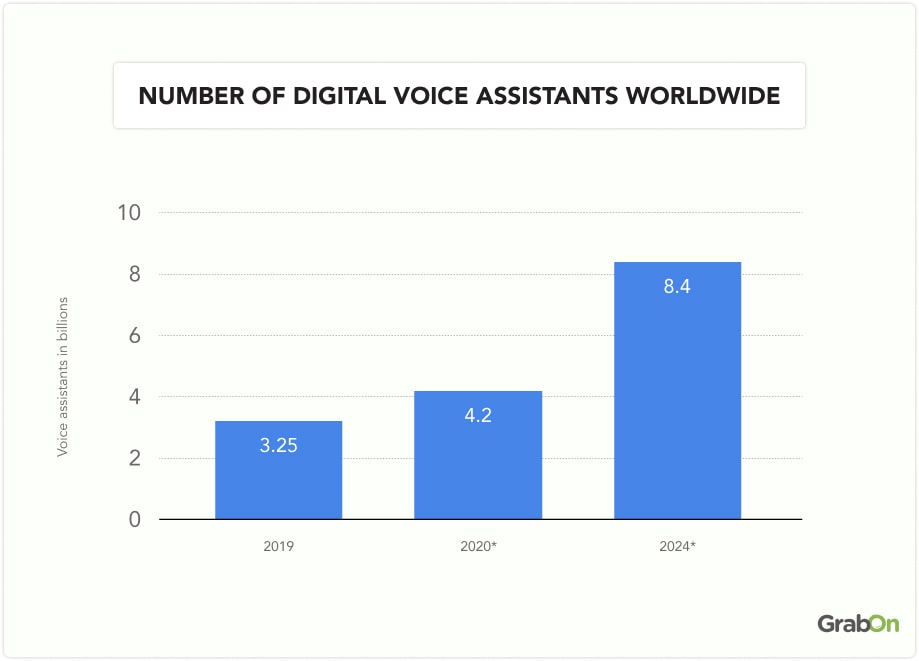
(Source: Amazon, Statista, Expanded Ramblings)
Alexa Demographics
- The Alexa application has 68.05% male users and 31.95% female users.
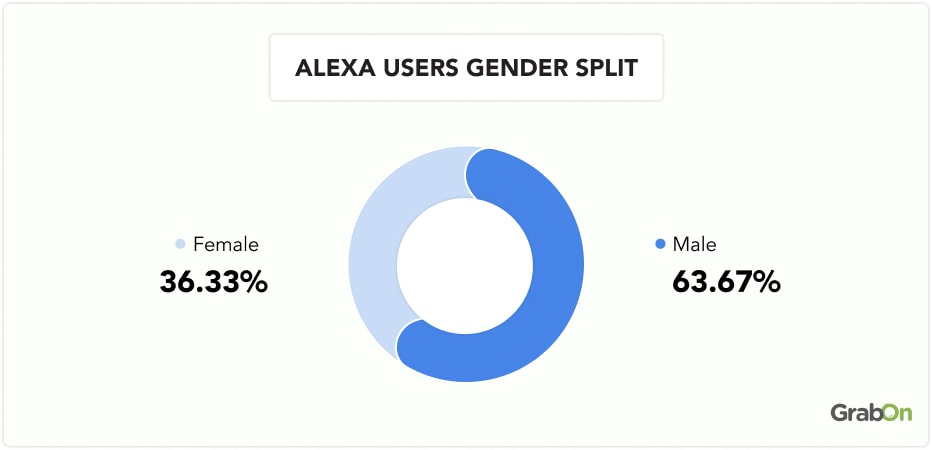
- Alexa is most popular among users aged 25-34 (27.6%) and 35-44 (20.35%). Users aged 45 and older comprise a significant portion (over 35%) of the user base.
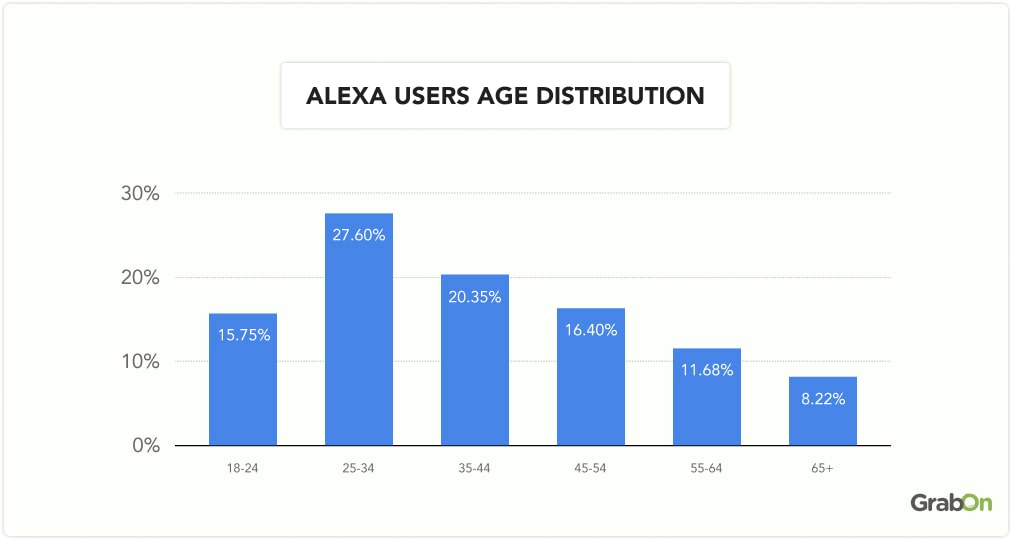 (Source: Similarweb)
(Source: Similarweb)
Alexa Market Share
- Alexa has a 65% market share in the smart speaker market in the USA. The next closest competitor is Google Home, holding 24% of the market. Apple HomePod follows with an 18% share. Smaller brands such as Eufy Genie, Fabriq, Lenovo, Panasonic, Harman Kardon, Sonos, iLuv Aud Click, and Qualcomm each capture between 4% and 7% of the market. Despite various competitors, Amazon Echo's market dominance underscores its strong foothold and widespread use among consumers.
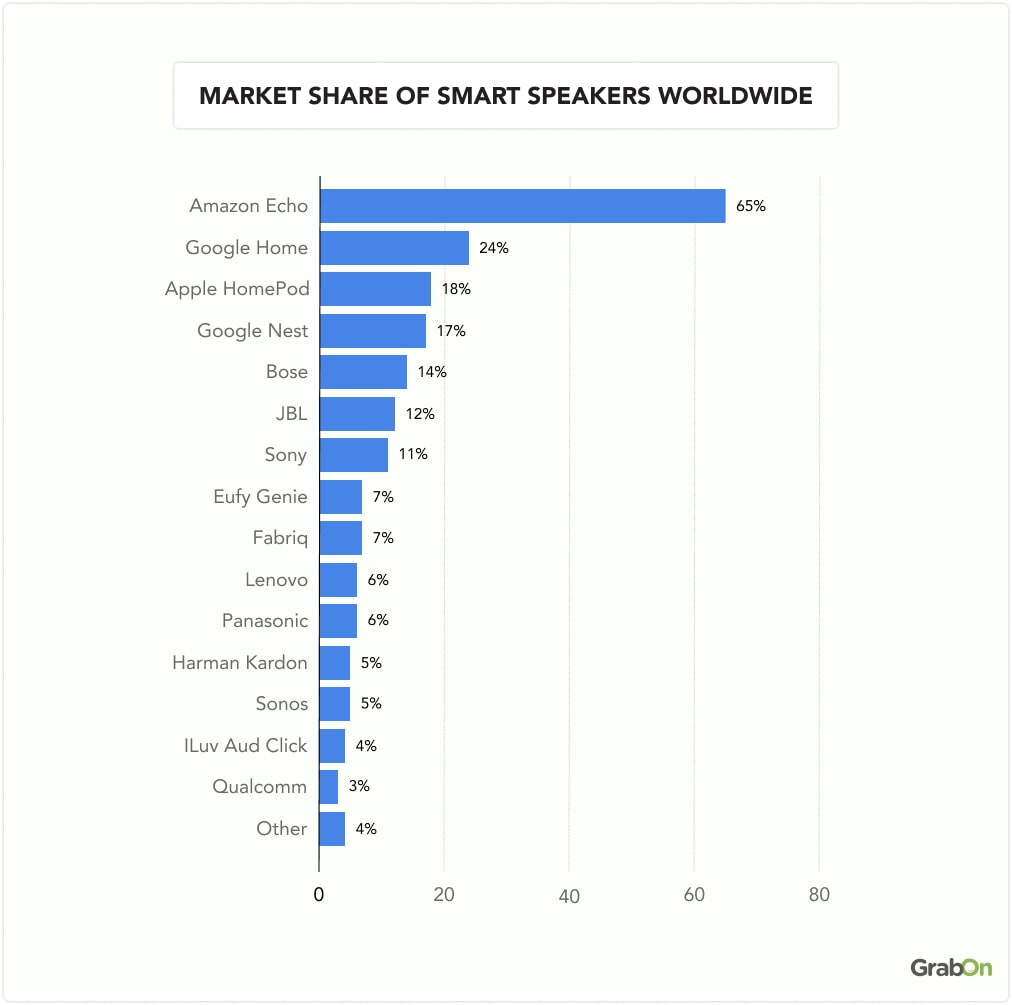 (Source: Statista)
(Source: Statista)
Alexa Usage By Country
- In the US, Alexa dominates with a 70% share of the smart speaker market.
- In the UK, 39% of smart speaker owners use Alexa.
- Alexa holds a substantial 63% market share in the smart speaker segment in Canada
- In Australia, Alexa is used by 59% of smart speaker owners.
- Alexa captures 55% of the smart speaker market in Mexico
- In Brazil, Alexa has a 50% market share among smart speaker users.
(Source: Gitnux)
Alexa Usage Stats
- Approximately 84.9% of Alexa users have requested to set a timer or alarm, 82.4% have asked Alexa to play songs, and 66% have used the assistant to read the news.
- Alexa is mostly used by people who:
- prefer voice control in their smart homes
- love playing music, hearing news and weather updates, and setting up alarms
- need a personal assistant
- regularly do online shopping
- enjoy using convenient devices
- Around 11.5% of buyers use Amazon Alexa for online shopping, with approximately 18% of these users belonging to younger generations, particularly Millennials.
(Source: Earthweb, Expanded Ramblings)
Alexa's Skills Statistics
- In 2024, Amazon Alexa continues to expand its capabilities with over 100,000 skills available globally. These skills range from productivity tools and smart home controls to entertainment and health and fitness applications. Some of the most popular skills include:
Music and Audio: Integrations with Spotify, Apple Music, and Amazon Music.
Smart Home: Controlling devices like Philips Hue, Nest, and Ring.
Productivity: Managing calendars, to-do lists, and reminders.
Entertainment: Playing games, trivia, and interactive stories.
Health and Fitness: Guided workouts, meditation, and health tracking
Additionally, Alexa has introduced new generative AI skills, such as custom chatbots, music creation, and immersive quizzes.
(Source: Voicebot.ai)
How Many People Work for Amazon Alexa?
As of 2024, approximately 10,000 employees are working on Amazon Alexa. This team is dedicated to developing and enhancing Alexa’s capabilities, including its artificial intelligence, machine learning, and user interaction features.

Amazon, in total, employs approximately 1.525 million people globally. This includes full-time, part-time, and seasonal workers across various sectors such as e-commerce, cloud computing, and smart home technology.
(Source: The Wall Street Journal)
Amazon Alexa Vs. Siri
Amazon Alexa and Apple Siri are two leading virtual assistants, each with distinct advantages. Alexa, developed by Amazon, is renowned for its broad compatibility with smart home devices and seamless integration with Amazon services.
Siri, Apple’s virtual assistant, is designed for the Apple ecosystem. Siri excels in its deep integration with Apple services and devices, making it ideal for Apple users. Both assistants use advanced voice recognition and natural language processing to assist with tasks, answer questions, and control smart home devices.
Skills
- Alexa: Boasts over 100,000 skills, from controlling smart home devices to playing games and providing news updates.
- Siri: While Siri does not have a comparable “skills” ecosystem, it offers a wide range of built-in functionalities and integrations within the Apple ecosystem.
Integration
- Alexa: Compatible with over 100,000 smart home devices and supports over 100,000 skills. It integrates well with many third-party applications and devices, making it highly versatile.
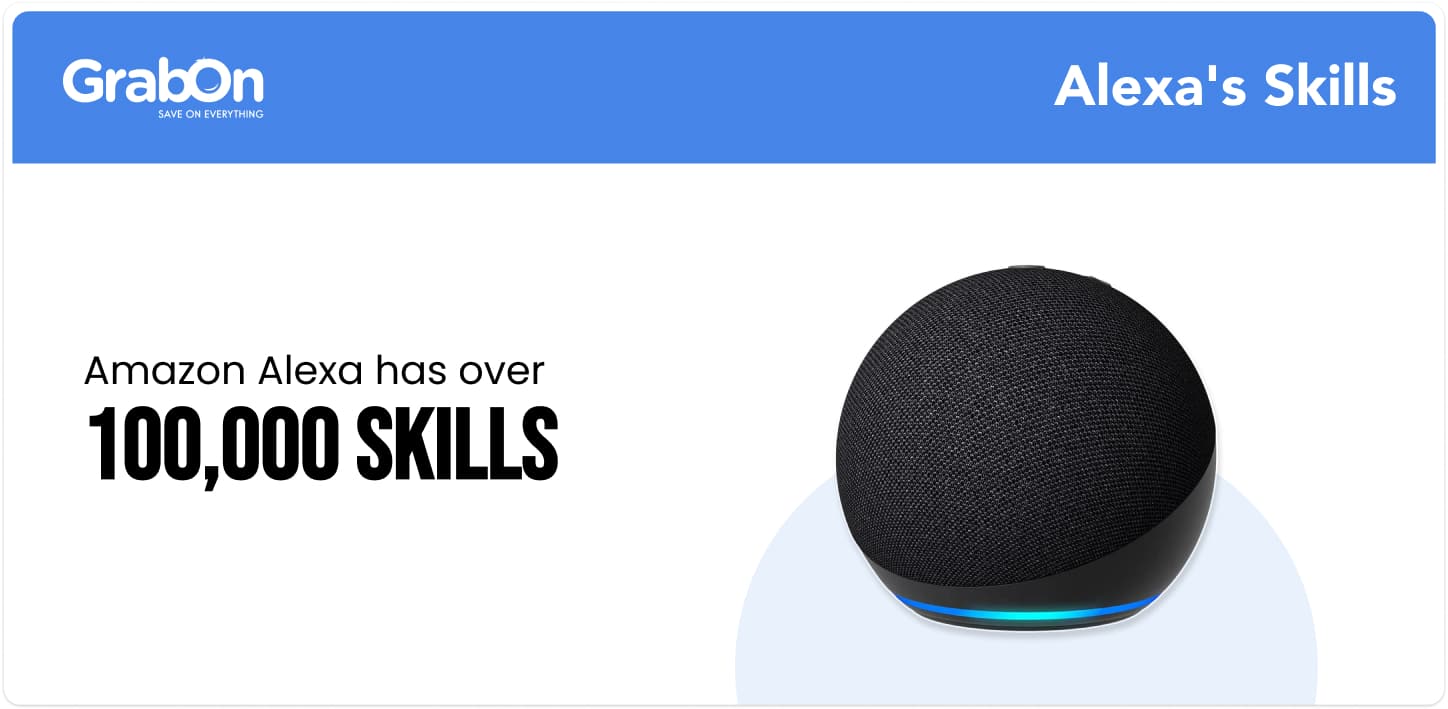
- Siri: Works seamlessly within Apple’s ecosystem, including iPhones, iPads, Macs, Apple Watches, and HomePods. However, it has more restrictive third-party app integration compared to Alexa.
Usage Comparison
- Alexa: Widely used for smart home control, music streaming, setting reminders, and shopping on Amazon. It excels in understanding natural language and executing complex commands.
- Siri: Commonly used for setting reminders, sending messages, making calls, and controlling Apple devices. Siri is known for its quick responses and integration with Apple’s services.
Amazon Alexa Vs. Google Home
Amazon Alexa and Google Home are leading smart home assistants, each with unique strengths. Alexa excels in smart home integration and offers superior music services, making it ideal for those seeking robust smart home control. Google Home, powered by Google Assistant, is known for its excellent smart displays and intuitive in-app controls, making it a great choice for users who value visual interfaces and multitasking.
Market Share
- Alexa: Leads the smart speaker market with approximately 65% market share.
- Google Home: Holds around 24% of the market.
Usage and Capabilities
- Alexa: Known for its extensive skill set, with over 100,000 skills available globally. Amazon Alexa also has an accuracy rate of approximately 79.8% for correctly answering questions. It excels in smart home integration, music streaming, and shopping via Amazon.
- Google Home: Google Assistant is praised for its accuracy in answering questions, understanding 99% of queries, and responding accurately 93% of the time. It integrates well with Google services and offers robust real-time language translation.
Integration
- Alexa: Compatible with over 100,000 smart home devices and supports a wide range of third-party applications.
- Google Home: Integrates seamlessly with Google services and supports various smart home devices, though fewer than Alexa.
User Rating
- Amazon Alexa generally receives positive reviews, with an average user rating of 4.3 out of 5 stars on Amazon. Users appreciate its extensive smart home compatibility and integration with Amazon services.
- Google Home, now part of the Google Nest family, also has favorable reviews. On the Google Play Store, it has an average rating of 4.1 out of 5 stars.
What is Alexa+?
Alexa+ is the next generation of Amazon’s virtual assistant, powered by generative AI. It offers a more conversational, smarter, and more capable experience than the previous versions of Alexa. Here are some key features of Alexa+:
- Enhanced Conversational Abilities: Alexa+ can understand and respond to more complex and natural language, making interactions feel more like talking to a friend.
- Task Management: It can help you manage your home, make reservations, order groceries, and even find event tickets.
- Personalization: Alexa+ provides personalized suggestions based on your interests and habits.
- Integration with Devices and Services: It can control various smart home devices and services, from Philips Hue lights to Ring cameras.
Alexa+ is free with an Amazon Prime subscription and works best on Amazon's touchscreen smart displays, such as the Echo Show.
Smart Speaker and Home Device Statistics
Here are the key statistical insights on smart speakers and other smart home devices:
Smart Home Device Ownership in the U.S.
- Smart TVs are the most common smart home device, with 64% of surveyed respondents owning one.
- Smart speakers are owned by 27% of respondents, making them the second most popular device.
- Streaming devices such as Amazon Fire TV are owned by 24% of respondents.
- Devices like smart security cameras and Bluetooth speakers without a voice assistant each have a 20% ownership rate.
- Lower ownership rates were reported for smart bulbs (19%), smart plugs (15%), large smart appliances (15%), connected thermostats (14%), and smart locks (13%).
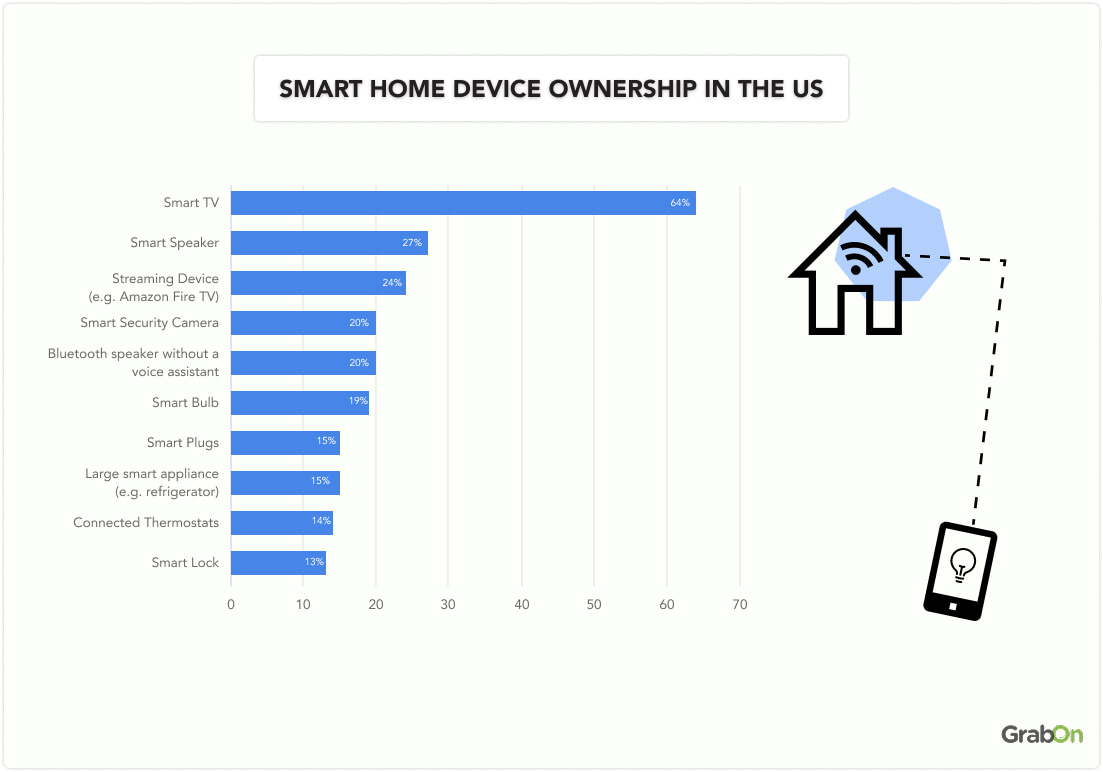
Learning Channels for Smart Speakers
- The majority of users (45%) learn new skills or actions for their smart speakers through recommendations from friends or family.
- Emails from brands such as Amazon, Google, or Apple are a learning source for 34% of users.
- 29% rely on searching through the smart speaker app, while 24% depend on recommendations directly from their smart speakers.
- Advertising campaigns about smart speaker skills and news/tech sites each attract 18% of users.
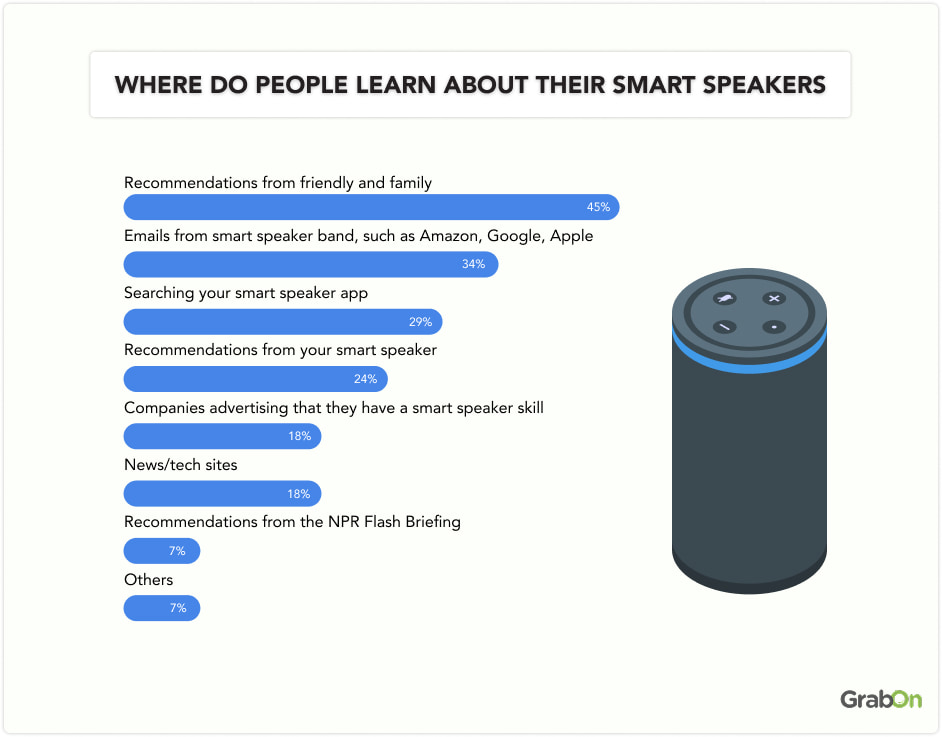
Room Placement of Smart Speakers in U.S. Homes
- The living or family room is the most common location for smart speakers, with 52% of owners placing their primary speaker there.
- The kitchen is the second most popular spot, with 24% of speakers situated there.
- 12% of users keep their primary smart speaker in the master bedroom.
- Other locations include other bedrooms (5%), home offices (4%), and miscellaneous spaces (3%).
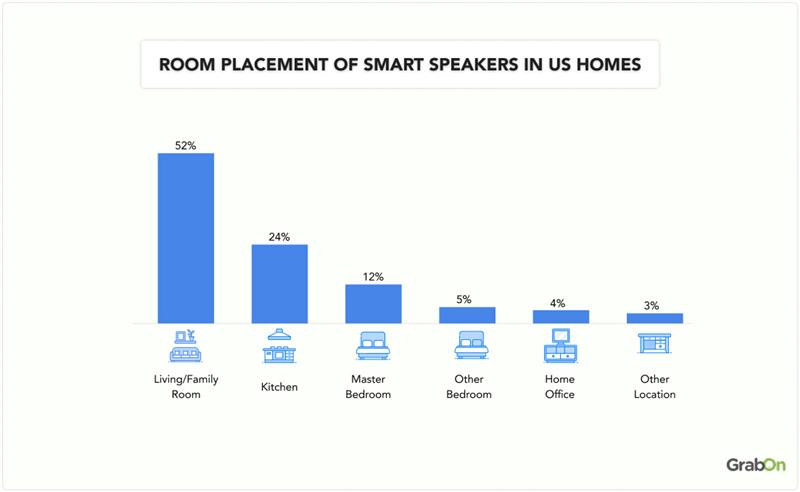
(Source: Statista)
Answering Some FAQs On Alexa
Amazon Alexa is a versatile virtual assistant that can help with various tasks, from controlling smart home devices to providing weather updates and playing music. This section addresses some of the FAQs about Alexa, offering insights and ensuring a seamless user experience.
-
What is an Amazon Alexa used for?
Amazon Alexa is a versatile virtual assistant designed to make everyday tasks easier and more convenient. It can play music, provide weather updates, deliver news and sports scores, control smart home devices, set timers and alarms, and even order products from Amazon. Alexa can also make hands-free voice or video calls, answer questions, and offer flash news briefings. Its integration with a wide range of smart home devices makes it a central hub for managing your connected home.
-
Is Alexa an AI device?
Yes, Amazon Alexa is an AI-powered virtual assistant. It uses advanced artificial intelligence, including natural language processing and machine learning, to understand and respond to voice commands. Alexa can perform a wide range of tasks, such as controlling smart home devices, providing information, playing music, and more. Its AI capabilities allow it to learn from user interactions and improve over time, making it more intuitive and useful.
-
What is the difference between Amazon Alexa and Amazon Echo?
The difference between Amazon Alexa and Amazon Echo lies in their roles and functions. Alexa is the AI-powered virtual assistant software that processes voice commands and performs tasks like playing music, providing weather updates, and controlling smart home devices. Echo, on the other hand, refers to the physical hardware devices, such as smart speakers and displays, that house Alexa. Essentially, Alexa is the brain, while Echo is the body that enables you to interact with Alexa.
-
Is Alexa free to use?
Yes, Amazon Alexa is free to use. You can access Alexa’s core features without any subscription fees by downloading the Alexa app on your smartphone or using an Alexa-enabled device like an Echo speaker.



